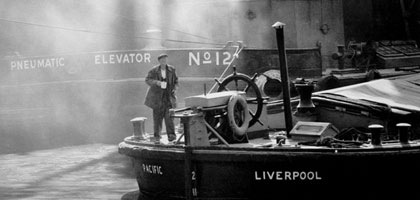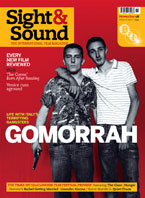The Mersey Sound
Film of the Month: Of Time and the City

Terence Davies takes a fresh look at his home city and himself in 'Of Time and the City', his elegiac yet prickly documentary, a hymn to the culture of Liverpool's past and a critique of its development. By Ryan Gilbey
Cinephiles wonder if it will be the life of another person (Margo Channing? Michael Corleone? Antoine Doinel?) that flashes before their eyes at the point of death. Even a casual admirer of recent British cinema may feel that way about Terence Davies, who has been rehearsing his autobiography in film for so long and in such detail that some of us are more familiar with it than we are with our own. Between 1976 and 1983 he shot and assembled his stark Trilogy (Children, Madonna and Child, Death and Transfiguration) before reshaping his upbringing into colour tableaux for Distant Voices, Still Lives (1988) and The Long Day Closes (1992).
This self-excavation continues in the documentary-essay Of Time and the City, where autobiography feeds a broader social commentary on his birthplace, Liverpool. The picture begins in a familiar state of conflicted reverie, with Davies as narrator rejoicing in his memories, complemented by archive montages of doorstep-scrubbing, ration-book-touting, coalfire-stoking working-class Liverpudlians; the poetry of T.S. Eliot (misspelled as 'Elliot' in the end credits) mingles with the street-corner palare of Julian and Sandy, the camp figures played by Kenneth Williams and Hugh Paddick in the radio series Round the Horne.
The focus narrows to specific points in Davies' youth - a crush on a classmate, the realisation of his own atheism, a tendency to gorge on movies "with a frequency that would shame a sinner" - before zooming out to diagnose the effect on Liverpool, and England, of the subjects such as the Korean war or civic redevelopment. Reflecting on the 1947 wedding of the future Queen Elizabeth II - "the start of the Betty Windsor Show" - Davies drops in shots of black-and-white gunships so that they appear to be opening fire on the happy couple. Briefly and comically, the film seems on the verge of becoming Jarman's The Last of England. Davies is on stronger ground when the picture is personal rather than sweeping. The discourse on the pleasures of Saturday afternoon wrestling matches between beefy men in executioners' masks carries the same taboo jolt as when Tucker asks to have his "bollocks" tattooed in Madonna and Child.
Among Englishmen, only Alan Bennett, another gay voice from a northern working-class background, has wrung more product from his past. Bennett styles his reminiscences as class-conscious, tea-table chit-chat. Davies, meanwhile, pitches his poverty-row anecdotes at an almost operatic level, capturing the spectre of the angry Catholic God in whose shadow his fearful childhood was "unspent", as Philip Larkin put it in 'I Remember, I Remember'. The conflict in Of Time and the City is as pronounced as anything in Bennett or Larkin: between England then and now, high and low culture, carnality and shame.
Of Time and the City can be seen as the cinematic equivalent of a Larkin poem. Those sections of the film devoted to street parties or day trips to New Brighton (where Davies remembers "gobstoppers that would last until your middle-age") combine with the pin-sharp observations found in Larkin's 'Show Saturday' or 'To the Sea': "Everything crowds under the low horizon:/ Steep beach, blue water, towels, red bathing caps". In Larkin, the flipside of this sharpness is the wistful, bitter envy of youth brought on by middle-age, as in 'High Windows' ("everyone young going down the long slide/ To happiness, endlessly") and manifested in Davies' film in stretches of footage that regard anything modern or merely unfamiliar with disapproval. "Now I'm an alien in my own land," he laments near the end of the picture, uncomfortably invoking a Little Englander persona that is never far away whenever people complain that it was all fields around here when they were young.
In drawing again on his life, following a brace of literary adaptations (The Neon Bible, The House of Mirth) that invoke it only obliquely, Davies somewhat miraculously finds a new angle: the friction between the artist anchored in the past, and the world that continues turning. He has no compunction about playing out this struggle in public. An interview he gave to the Guardian in late 2006, when it looked as if he might not return to film-making, was notable for the lack of discrimination with which he selected his targets.
Davies' curmudgeonly side jostles with his more romantic self in Of Time and the City. In choosing to narrate the film he has made himself as much its subject as Liverpool. This is no mere voiceover, but a carefully modulated performance that dictates the film's tone and texture as forcefully as Michael Hordern in Barry Lyndon or Paul Scofield in London. The portentousness he brings to innocuous phrases - "dripping in Chanel", "Queen of the South" - renders the mundane macabre or mysterious. His theatrical enunciation will be an easy target for ridicule (one colleague likened it to Richard Griffiths' Uncle Monty from Withnail & I) but, for all the other achievements on display here, there would be no film without it.
If Davies' delivery is to be cherished, his actual words can be rancorous and unfair. His imposition of a Johnny Rotten-like "yeah, yeah, yeah" over footage of Lennon and McCartney at the microphone is a pleasantly abrasive trick, but when he dismisses the Beatles for looking like "a firm of provincial solicitors" and disparages their songwriting, he sounds like James Bond in Goldfinger, sneering that no one should listen to the Beatles "without earmuffs".
His delight in his own Grinch-like persona dictates the choice of footage, as he represents the more recent past with misery-soaked shots of families and children moping around 1960s and 1970s Liverpool: a couple trudge along behind a pushchair, a sullen Afro-Caribbean girl appears to be imprisoned behind the bars of her balcony. It's one thing for Davies to structure the film around his personal reflections on Liverpool, quite another to write off entire generations because they don't square with his views of society, pleasure or progress. He looks back fondly on a time "when all the world was young and knew no bounds" without considering that the world remains as boundless for the young now as it was for him in the 1950s.
Those younger than Davies (the director is 63) are likely to miss many of his references, in-jokes and allusions. I wouldn't have known, for example, that Fauré's 'Dolly Suite', which plays over a modern-day montage of children toddling around Liverpool's streets and shopping precincts, was the theme tune to Listen with Mother unless my older companion at the screening had not pointed it out to me. Nevertheless, even viewers who haven't heard of Peggy Lee will grasp why her version of 'The Folks Who Live on the Hill' plays over footage of the towerblocks sprouting up across Liverpool in the 1960s. What will escape no one's notice is the film's fierce passion, which renders it both serious enough to argue with and rich enough to wallow in.
Davies laments the approach of death, but his film is a protest against it. "The golden moments pass, and leave no trace," he purrs, quoting Chekhov. Like cinema itself, Of Time and the City suggests otherwise.


